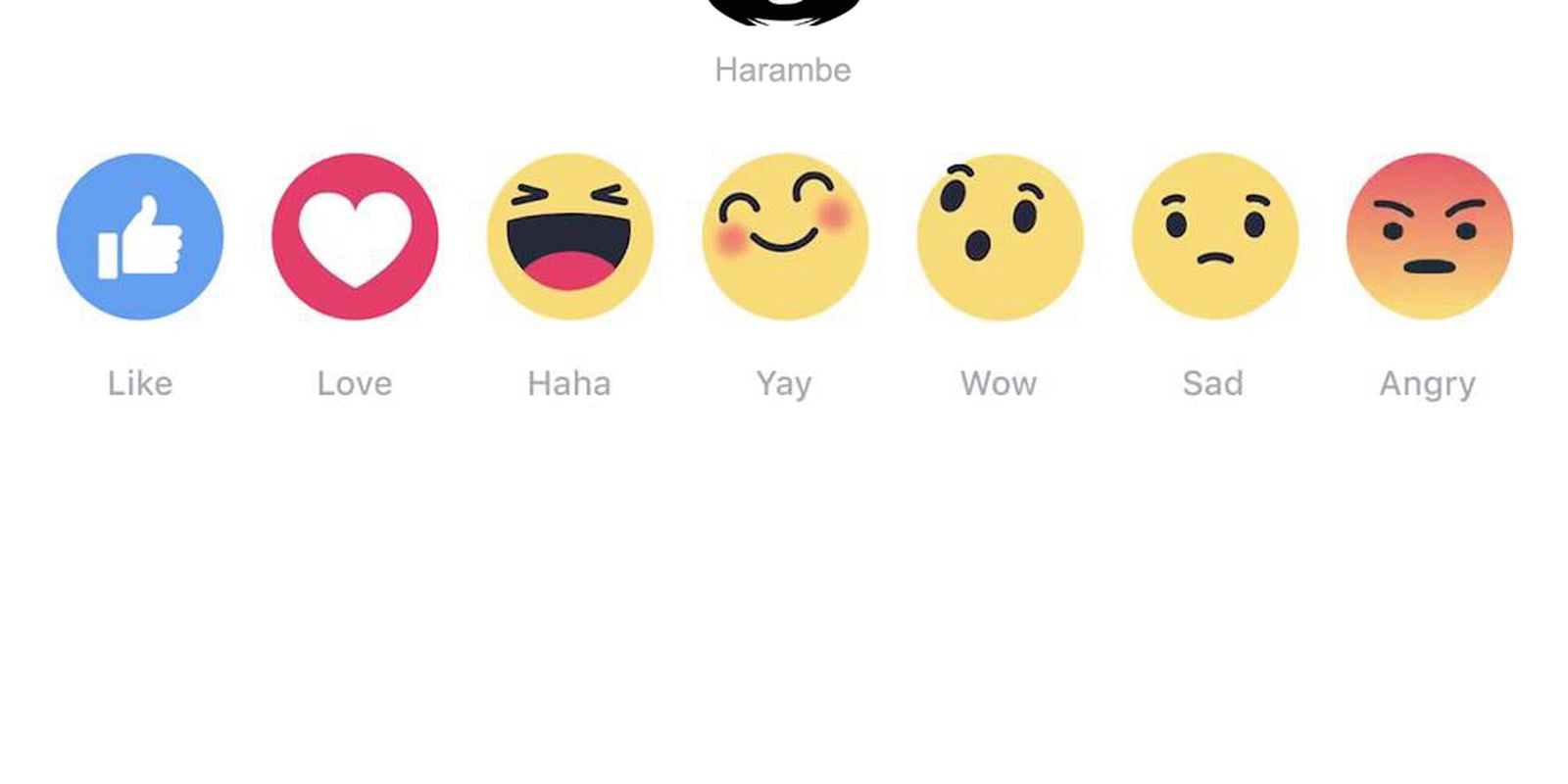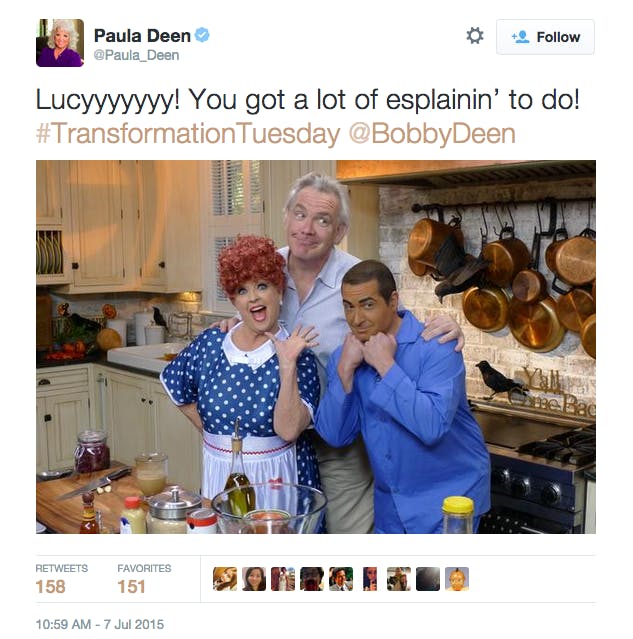Paula Deen just “is who she is.”
It’s the tearful confession the cooking guru offered on the Today Show couch in 2013, as she attempted to quell the flames of controversy—a now-dismissed discrimination lawsuit revealed that she’d used the “N-word” and made offensive jokes about black people. After a video of Deen surfaced, in which she summoned a black employee to the stage for a joke about his dark hue of skin, the Internet responded with righteous anger. Soon after, Deen lost her beloved Food Network show, and major retailers including JCPenney, Walgreens and Sears cut their ties with her brand.
Undoubtedly, the social media backlash, including the merry-go-round of negative headlines and thinkpieces, gave big businesses no other choice but to keep their distance. If a disturbing post from Tuesday morning is any indication, Paula Deen indeed has plenty of racist skeletons in her closet. We don’t know how much progress she’s made in understanding and empathizing with black people and communities of color, especially as it relates to racist jokes.
But this time around, the shame parade took hold even before most knew—or didn’t seek to verify—the nature of the tweet from Deen’s account.
Public shaming may very well have its role in calling out public figures for wrongdoing, but it’s not a failsafe tool. And without taking time to exercise discernment, to figure out how to best channel one’s disagreement and distaste for problematic behavior, the move to ridicule undermines the effectiveness of shame as tactic for prompting any semblance of accountability.
#PaulaDeen throws social media guy under bus for ‘Brownface’ tweet but fails to mention why she posed for such offensive pic in 1st place!
— Areva Martin, Esq. (@ArevaMartin) July 8, 2015
https://twitter.com/chrisconsiders/status/618492617962098688
https://twitter.com/FKADaniella/status/618447269877002240
Even after something of a resurgence—including the launch of her digital network and a new radio show and podcast—it took just one tweet for Deen to go from comeback queen to the bane of the ball all over again. In a #TransformationTuesday post, Paula and Bobby Deen, her son, were pictured costume as the iconic TV duo Lucy and Ricky Ricardo from I Love Lucy. According to the Independent, the photo itself was taken during the filming of Paula’s Best Dishes in 2011, during which Bobby used brownface and painted-on thick eyebrows apparently to make himself look more Latino.
The tweet, sent from Paula’s account, quotes one of Ricky Ricardo’s most famous catchphrases. And what they probably thought was a homage to a classic TV actor only added further insult to injury, with a written affectation of Desi Arnaz’s Cuban accent: “Lucyyyyyyy, you got a lot of esplainin’ to do!” The tweet was later deleted.
Deen can’t seem to shake off her history of racism. In this case, she’s guilty by direct association—the tweet in question came from her account, as she gleefully smiled and stood alongside her son Bobby, who has publicly disavowed any racist behaviors or business practices from the family. Denying her use of the “N-word” in an interview with CNN, Bobby said in 2013, “I’m disgusted by the entire thing because it began as extortion and it’s become character assassination and our mother is not the picture of this being painted of her.”
But this time, a picture is, indeed, worth a thousand words—and then some. According to social media analytics tool Topsy, Deen has been the subject of more than 25,000 tweets in the first day since the photo surfaced on her account.
Even though the image itself is old news, that it revived racial tensions from two years ago was enough for Deen to quickly fire the social media manager responsible for the post. A Deen rep told told E! News that “Paula immediately had this picture taken down as soon as she saw the post and apologizes to all who were offended.”
To be fair, this may very well be a result of poor discernment from a Deen employee, and brands aren’t immune to controversy over questionable posts. For example, U.S. Airways inadvertently tweeted a pornographic image (NSFW) from its account in April 2014, but the company chose not to fire the person responsible. As Cosmopolitan noted, the company determined it was an honest mistake made while the employee tried to report the tweet in question.
A perfunctory tweet from Deen’s social media manager speaks volumes about her social media manager’s lack of understanding how brownface, blackface, and the like only serves to denigrate people of color. It’s also yet another public revelation of the Deen family’s racist antics, despite their previous defenses against such behavior.
But without the context, and only the image itself as a basis of outrage and criticism, thousands of tweets condemned Deen for not having learned anything from the 2013 controversy—and understandably so. Her past behavior still registers levels of resentment and distrust, even from people who would’ve never purchased a Paula Deen cookbook. Two years have gone by and there’s no substantive sign that she’s working to make amends, other than tell-all interviews about her journey and even a sit down on Steve Harvey’s talk show, where he asked her to speak at his mentoring camp for young, fatherless black men.
But her intent to do better and repeated public appeals for forgiveness aren’t enough, for some. Even the slightest reminder of past wrongdoing, even in a poorly-devised tweet, is enough to send factions of the Internet into a tailspin of shaming.
Time will tell whether or not Deen’s acts of seeking accountability and reconciliation are authentic and go beyond the typical press junket for stars doing damage control. Although she’s not speaking out directly about the tweet, for now, Deen’s move to fire her social media manager may be all the signal the public needs to understand her commitment to improving how she handles issues of race and diversity.
In this case, the public move to shame an offensive tweet prompted decisive action from Deen. It doesn’t change the past; nothing can. At this point, all Deen can do is internalize the lessons to be learned, and make an earnest effort to help the communities she’s hurt.
https://twitter.com/TheHikingDiva/status/618801583023869953
Shaming, however, has its limits as a tool for accountability. In the case of Donald Trump, who remains unrepentant about calling Mexican immigrants “rapists” and “drug dealers” who don’t deserve a sustainable pathway to citizenship, shaming has done nothing to change his mind. In his case, as a wealthy, white businessman, he has relatively less to lose from brands and companies severing ties over inflammatory, racist remarks.
In either case, be it Deen’s apologies or Trump’s arrogance, shaming addresses public figures who are symbolic of social, institutional, and historical issues related to white privilege and supremacy. And as their actions, past or present, align with a system of oppression, the public move to outrage is rooted in decades of violence—physical, mental, emotional, and even financial damage—against communities of color.
Thus, it’s not just a matter of one person saying bad words. It’s how their words, and unconscious thoughts, become a reality in how they conduct business.
But despite Deen’s celebrity status, she’s still a person. Where there’s an opportunity for redress, as it is with Deen, public shaming should be a last resort, not as the first course of action for correcting problematic behavior. Yes, calling out is sometimes necessary, but it’s important to allow space for humanity. After all, there’s usually more to the story than what fits in 140 characters.
Derrick Clifton is the Deputy Opinion Editor for The Daily Dot and a New York-based journalist and speaker, primarily covering issues of identity, culture and social justice.
Photo via Paula Deen/YouTube



